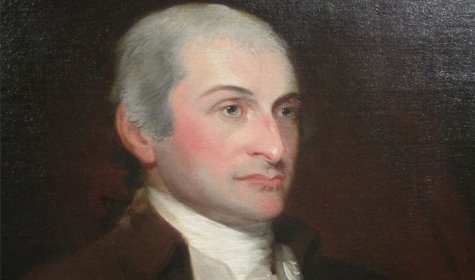In Federalist #3 and Federalist #4, John Jay made the case that “union, strength, and good government” would secure Americans from dangers from abroad. In Federalist #5, he returns to a theme he introduced in Federalist #2 – the inadequacy and disadvantages of separate confederacies.
Jay argues that a divided America will not only project weakness and invite foreign aggression, but it will also lead to internal conflict and infighting, and an even greater degree of weakness.
To make his case, he turns to England, writing, “The history of Great Britain is the one with which we are in general the best acquainted, and it gives us many useful lessons.”
Jay’s use of England as his prime example, despite the fact America just fought a long war to free itself from the empire, reveals the attachment Americans still felt toward the “motherland.” The impassioned appeal to English government as the model carries with at least a small amount of irony. Jay apparently felt confident most Americans would not view the consolidation of the British Empire as a source of the tyranny they fought to throw off.
Jay opens Federalist #5 with an excerpt from a letter Queen Anne wrote to the Scotch Parliament during its process of unification with England in the early 1700s.
“An entire and perfect union will be the solid foundation of lasting peace: It will secure your religion, liberty, and property; remove the animosities amongst yourselves, and the jealousies and differences betwixt our two kingdoms,” Anne wrote.
Jay points out that while it seems common sense would dictate that a single island would be united as one nation, England, Scotland and Wales for long periods were divided and “were almost constantly embroiled in quarrels and wars with one another.”
Jay then draws a parallel.
“Should the people of America divide themselves into three or four nations, would not the same thing happen? Would not similar jealousies arise, and be in like manner cherished? Instead of their being ‘joined in affection’ and free from all apprehension of different ‘interests,’ envy and jealousy would soon extinguish confidence and affection, and the partial interests of each confederacy, instead of the general interests of all America, would be the only objects of their policy and pursuits.”
Jay goes on to assert that these confederacies would certainly not remain on equal footing very long. One would inevitably grow stronger than the others and “at that moment would those neighbors behold her with envy and with fear.” He emphasizes this point by playing on regional prejudices that already existed in America.
“The North is generally the region of strength, and many local circumstances render it probable that the most Northern of the proposed confederacies would, at a period not very distant, be unquestionably more formidable than any of the others. No sooner would this become evident than the NORTHERN HIVE would excite the same ideas and sensations in the more southern parts of America which it formerly did in the southern parts of Europe. Nor does it appear to be a rash conjecture that its young swarms might often be tempted to gather honey in the more blooming fields and milder air of their luxurious and more delicate neighbors.”
Keep in mind Jay’s primary audience was New Yorkers. While we tend to think of New York as a “northern state,” during the ratification period, it actually shared common interests with a distinct grouping of “middle states,” including Pennsylvania and New Jersey. These states were culturally distinct from New England, and significant rivalry existed between them. Jay played on New York prejudice to emphasize the benefit of union.
Jay continues to build on the fear factor, arguing that the competition and jealousy between the confederacies would lead to constant “discord, jealousy, and mutual injuries” that “would place us exactly in the situations in which some nations doubtless wish to see us, viz., FORMIDABLE ONLY TO EACH OTHER.”
But couldn’t the confederacies remain independent and yet still unite together in the face of foreign enemies? Jay answers with an emphatic, “No!” arguing that the divergent interests would preclude cooperation.
“Different commercial concerns must create different interests, and of course different degrees of political attachment to and connection with different foreign nations,” he wrote. “Nay, it is far more probable that in America, as in Europe, neighboring nations, acting under the impulse of opposite interests and unfriendly passions, would frequently be found taking different sides.”
Having argued through four papers that union depends on ratification and the security of America from foreign hostility and influence depends on union, Jay appeals to his reader to draw what he clearly sees as the only logical conclusion.
“Let candid men judge, then, whether the division of America into any given number of independent sovereignties would tend to secure us against the hostilities and improper interference of foreign nations.”
And with that, Jay exits the scene, contributing only one more paper much later in the Federalist.
EDITOR’S NOTE: The following is the fifth in a series of articles giving an introduction to the Federalist Papers, a collection of 85 articles and essays written by Alexander Hamilton, James Madison, and John Jay promoting the ratification of the United States Constitution.
The Tenth Amendment Center is a national think tank that works to preserve and protect the principles of strictly limited government through information, education, and activism. The center serves as a forum for the study and exploration of state and individual sovereignty issues, focusing primarily on the decentralization of federal government power as required by the Constitution. This article originally appeared at: http://tenthamendmentcenter.com/2015/06/14/federalist-5-turning-to-england/


:quality(75)/https://static.texastribune.org/media/files/3e555808dcf43d155e1dd3d974e189e3/0303%20Panhandle%20Canadian%20JR%20TT%2031.jpg?w=440&resize=440,264&ssl=1)
:quality(75)/https://static.texastribune.org/media/files/5f6cfa2391a3c86463567c002e5043e8/0217%20Cuellar%20Jeffries%20MG%20%2014.JPG?w=440&resize=440,264&ssl=1)
![The Constitutional Authority for State Border Defense and Security [VIDEO]](https://i3.wp.com/austincountynewsonline.com/wp-content/uploads/2024/04/Constitution-Border.jpg?w=440&resize=440,264&ssl=1)
:quality(75)/https://static.texastribune.org/media/files/d1749af8ff9fc79922234d2b56c4c730/0308%20Cruz%20SOTU%20REUTERS%20TT%2001.jpg?w=440&resize=440,264&ssl=1)